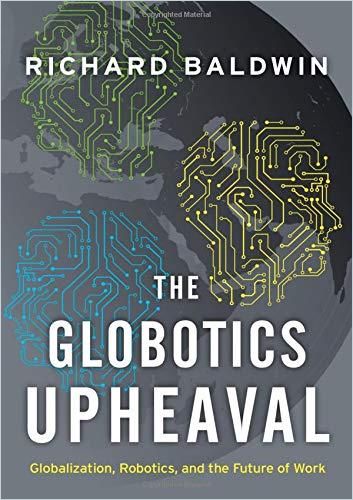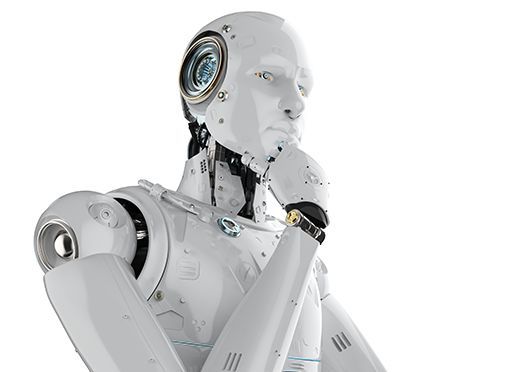“Almost everyone’s job will be changed by this.”

getAbstract: Richard, according to various recent studies, more than 90% of US business leaders believe that they and their employees are “well prepared” to face digitalization-related changes. Sounds very self-confident to me. Are they, in fact, well prepared?
Richard Baldwin: The word “digital disruption” was invented by people who thought they were prepared – or at least preparing – just before their companies were driven out of business, downsized, or otherwise disrupted by competitors using digital technology. It is something that has been going on for quite a while in, for example, retail sales.
Over the next few years, the number of jobs that white-collar robots will take over will be somewhere between big and enormous, you wrote in your new book The Globotics Upheaval. Do business leaders still underestimate the upcoming transformation?
Yes. In my view, many people are underestimating the pace and scope of change and aren’t thinking correctly about how it will appear this time.
How will it appear?
It will appear progressively with the changes happening at the task level, not the occupation level. Almost everyone’s job will be changed by this. The impact may at first show up as a cessation of new hires rather than firings. For instance, I chatted with the New Zealand immigration officer who let me into the country yesterday about automated immigration checks done by those booths where you stick in your passport. He said the officers liked them since it made dealing with big planeloads of visitors easier. Since the number of visitors is rising, managements don’t let any officers go, but new officers aren’t being trained.
In The Globotics Upheaval, you mention Alan B. Krueger and Alan S. Blinder’s research that approximately half of all management, business and financial work, can and might soon be done from abroad. In the United States, that would apply to 30% of administrative jobs and even 60% of jobs in professional, scientific and technical fields. How can professionals deal with this rapid change? What niches could they fill in the upcoming “new work order”?
In my book I discuss this a bit, although it is not really a self-help book.
The key is to develop skills that cannot be automated or outsourced to “telemigrants.”
But “Globots” – that is, AI-powered robots that will work whenever and wherever you wish – don’t play fair: they work 24 hours a day, never demand a lunch break and don’t need benefits. They don’t even need salaries. There is no way of competing with them, anyway. What could work instead?
Develop skills that require you to operate machinery or be in the room with other people, so you don’t compete with telemigrants, and focus on tasks that are difficult to automate, for example because gathering a big data set is difficult. In the book, I have an extensive discussion on what Artificial and Remote Intelligence can’t do now and what they are unlikely to be able to do in the future.
Do you have a real-life example or case study to illustrate a successful change process from an “old fashioned” system to a digital one?
Just think about how tube workers in London adapted to the automation of ticketing – buying and checking: they became customer reps on the platforms helping and guiding people using their people skills. Or, consider how some newspapers adapted to remote competition by focusing on extremely local news and events.
Although some of your predictions sound pretty gloomy, you are surprisingly optimistic in the end: “Human ingenuity and entrepreneurship will do their job and find jobs for all of us eventually”, you write. What makes you think that?
I think it will be progressive as AI and RI remove the dull things in our jobs. I think AI will in, say 10 years, enable average thinkers to have much more wisdom and judgment on various types of pattern recognition: nurses will be able to make diagnoses, paralegals will be able to offer legal advice and so on.
So, my suggestion, especially to business leaders facing these new problems, would be: get a good consultant!
And: read my book!
Sounds like good advice for politicians, too, because Globotics will “inject pressure into our socio-politico-economic system (via job displacement) faster than our system can absorb it (via job replacement)”, to quote your book. Should we, and especially political decision-makers, expect a new age of “industrial policy” and rising protectionism?
We will see much more of the kind of reaction Uber is facing: workers trying to slow the process down with regulations. Economic backlash and even massive resistance movements are possible and more likely than many think, but not sure. It all depends upon the speed of change and that’s impossible to know. But I can say that the chances are not small and probably bigger than most governments believe. Just watch the campaign videos of Andrew Yang!
Richard Baldwin is Professor of International Economics at the Graduate Institute, Geneva and President of the Centre for Economic Policy Research (CEPR). He founded VoxEU.org, an economic policy portal, and serves as its editor-in-chief.
Next Steps
Read our Abstract of “The Globotics Upheaval” now. Buy the book.
Still haven’t had enough of “Globotics” yet? Hear Richard Baldwin’s opinion on the future of work here (for the restless: our Abstract). And if all this makes sense to you: act within your institution using our brand new Sketch Notes!
Related Channels at getAbstract: Robots, AI Applications, Future of Work, Jobs of the Future.










